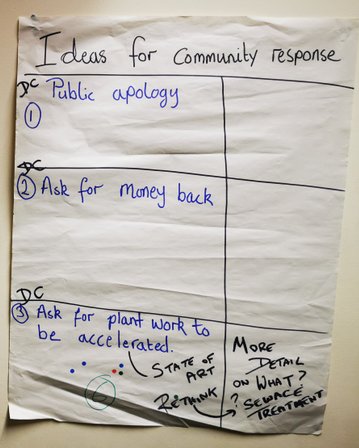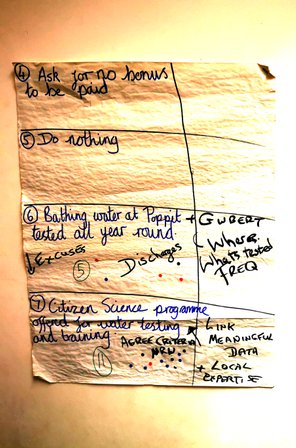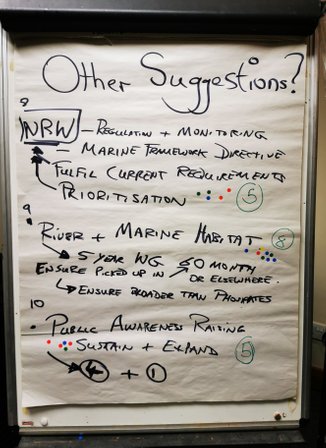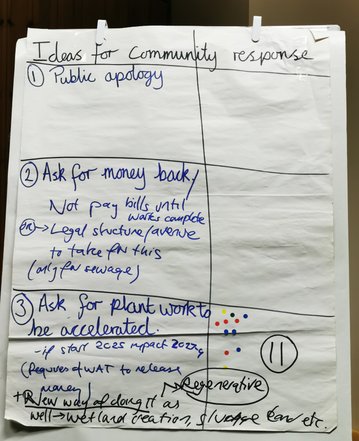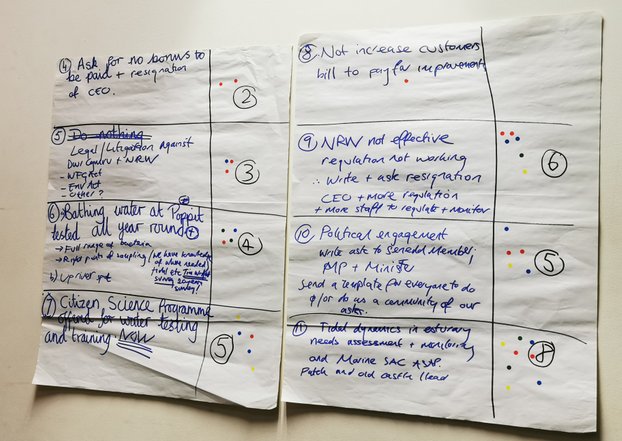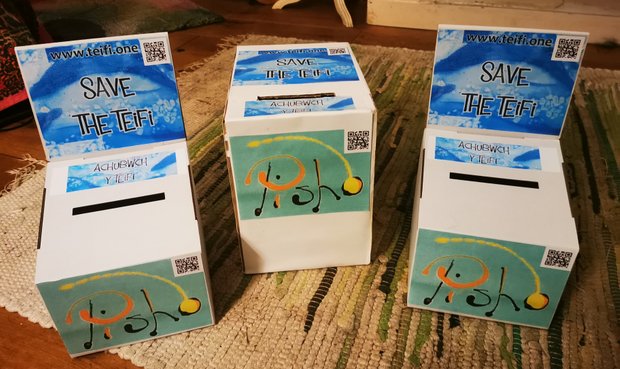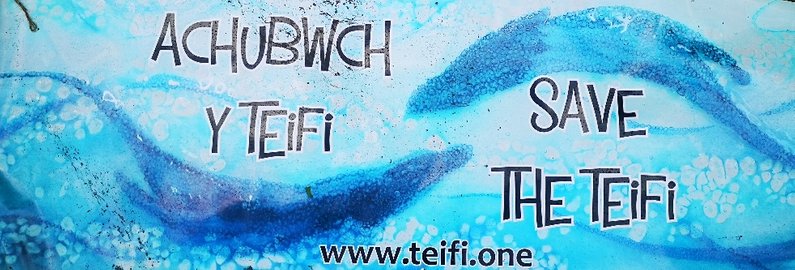Seventh Meeting in Cardigan 9-Nov-2023
At Mwldan 6 - 7.00 to 9.00pm
As people saw the report that’s hit the news on 19 Oct (See Latest News) about sewage releases in the Teifi from the Cardigan Sewage Processing facility there was and is a lot of frustration and anger. We organising this Save the River Teifi meeting to discuss the report with the Head of the Welsh Rivers charity (Afonydd Cymru) who commissioned it. We also had space to reflect and re-strengthen our actions as a campaign movement.
The agenda for the meeting was:
- Brief update on progress (see below)
- Presentation by Gail Davies-Walsh (Chief Exec of Afonydd Cymru) via zoom to outline the report they commissioned which highlighted the failures of Cardigan Sewage Works
- Small group discussions to identify what actions we should take to improve the quality of the river and estuary for society and the environment. (see below)
- How funds raised thus far are being/could be used.
_______________________________________________________________________________________________
Brief update on progress
Small group discussions to identify what actions we should take
Two groups were formed and the discussion were summarised on flip charts. These are shown here:
There was much discussion with expertise from several attendees evident. There was most response to 'Ask for Plant Work to be Accelerated', but with some caveats... Piers summarised some of these discusions with a Post on the STT FB page as follows:
DWR CYMRU - “WE’RE INNOCENT”
Dwr Cymru seem to be taking the position that not only have they been completely transparent about the ‘problems’ with the Cardigan Treatment works but also the spills have been of no real significance because the bathing water standard at Poppit Sands has tested as ‘excellent’.
This is a gross distortion of the truth.
- Testing at Poppit is only carried out twice a month from May to September, on a rising tide, at the western end of the beach between the Lifesavers flags (far away from the river mouth). This does not constitute a safe ‘scientific analysis’ and certainly should not be used to claim that ‘no environmental damage’ has occurred. To use the data to justify over 300 days of spills into the Teifi is outrageous.
- Bathing water quality at Poppit is only one aspect of the damage that has been done. To focus on the beach alone shows complete disregard for all of the environmental impacts on the Teifi itself, where fish stocks, plant life, waterfowl are all being effected. Furthermore, in recent years, with a huge increase in paddle boarding, kayaking and river swimming, bathing quality is now an issue for both sea and river.
- An analysis of Environment Agency data done by the Welsh Liberal Democrats revealed that last year Poppit was the most polluted of Blue Flag’ beach in the whole of the UK, with 79 sewage spill incidents. That’s 1,518 hours of spilling. We have to ask how these incidents could be missed if testing is thorough. Most likely it is because the taking of two samples a month is a net through which a host of incidents can fall. It’s simply not robust.
Dwr Cymru should be held accountable for claiming an evidence base to justify their actions which depends on such inadequate data. It is obvious to anyone who has an ounce of sense that spilling untreated sewage into the Teifi for over 300 days of the year will have an environmental impact. To claim otherwise on the basis of an inadequate testing regime at Poppit is arrogant and deceitful. We need an entirely new team to run this Company and rebuild trust with its customers..
There is a cosy idea that the river is like a toilet that flushes out to the sea on every tide. A local geologist/scientist who came to the Save the Teifi meeting last night pointed out that this isn’t the case, and that there is only sufficient water flow in the river to ‘flush’ to the sea on 90-100 days a year. This also explains why the Teifi has always been so vulnerable to silting up. The fresh water is held back by the salt water, meaning that sewage is held in the river until the salt water barrier is breached. You can often see this line where fresh water meets salt as a distinct feature in the estuary. River flow is lowest during summer months which means salt water damming is at its strongest. Any illegal ‘dry’ spills into the river during these months hang about for much longer, and can do more damage to the ecology of the river. It may also explain why the bacteria aren’t always reaching the flagged swimming end of beach (especially as the river vents out through the Gwbert end, not the western end where testing is done). Testing at Gwbert would likely bring a very different set of results. Will Dwr Cymru carry out a thorough analysis of these complicated tidal flow patterns in the estuary before they build their new plant, one wonders?
THE TEIFI - A RIVER WORTH SAVING
PISHO Project Update
Gwenda also updated us on the PISHO project (see Recycling Urine – Teifi-Forum) as she seeks to raise awareness of phosphate loss into the Teifi and to raise funds using these collection boxes, by distributing nuts, grown in her garden , in various locations in Cardigan:
Save the Teifi stering group are attempting to write up the "5 main asks" from this meeting. Jess has put much effort into this and has tried to include issues, with solutions context, but was aware this needs more work. This document then may form the basis of a people's plan for the Teifi.
Five Main Asks Document
Save River Teifi’s response to the sewage scandal at Cardigan sewage works and illegal dumping in lower Teifi and Estuary
1: Rapidly end the pollution from Cardigan sewage works and illegal discharges of untreated sewage
Issue: The Cardigan area of the river Teifi is the worst publicly-known case of sewage pollution - sewage work spilling, and illegal spilling of untreated sewage - in Wales (according to Peter Hammond 2023). The community and local wildlife have been forced to live with this for over a decade. Save The Teifi has had a number of meetings with Dŵr Cymru and mention was made of some seawater penetration affecting processing but there was not full transparency about the extent of the issues. Natural Resources Wales has been aware of this situation for over 10 years and has failed to regulate or issue any penalty. The community is extremely angry that this has been happening for so long and is alarmed at the impacts on biodiversity and human health.
Solution: Start the work on Cardigan sewage works promptly or provide robust evidence as to why there is a delay to this.
Use the opportunity of the new works to install a nature-based approach as part of the solution, or provide robust evidence as to why this is not possible.
2: Authorities to urgently undertake vigorous and comprehensive monitoring of river and estuary pollution and of bathing water quality at Poppit Sands
Issue: In response to the recent publication of Peter Hammond's assessment of illegal sewage spillages from Cardigan sewage works, Dŵr Cymru sent a letter to residents stating that there is no environmental impact from this because the bathing water quality at Poppit Sands meets 'excellent' bathing water quality standards. This contradicts the experience of the community. It is considered an inadequate indicator of the impact of sewage releases as the bathing water is only tested during summer months when less spilling is occurring. Neither does it measure the environmental impact on water quality in the estuary, its habitat and biodiversity – an issue which complicates the interface between river and coastal waters. Many members of the community report a decline in biodiversity and river health in the last decade. Over the last few years there has been a significant increase in incidents of sewage pollution indicated by noxious odours and algal blooms, with widespread alarm at the accelerating decline of many species.
Solution: Implement Water Framework Directive quality monitoring annually, including the estuary.
Create a platform to share, in real time, all the data and evidence that authorities have on river health in the lower part of the catchment, estuary and localised coastal waters.
Dŵr Cymru to outline how it is assessing the impact of sewage spills on the environment and publish the results for sites as they become available.
Bathing waters at Poppit Sands and Gwbert to be tested all year round.
Assessment and monitoring of the tidal dynamics of the estuary section to be published and shared in an accessible format to understand the effects of recirculated pollution.
Communities' experience of the decline in river and estuary environmental health over the last decade to be recorded as part of the qualitative evidence collected alongside the 'quantitative science-based approach' of current river health.
3: Comprehensive citizen science programme underway by Summer 2024
Issue: Communities along the river have been asking for a citizen science programme for a number of years from NRW and Dŵr Cymru to support their assessment of river health and bathing water quality. This is an opportunity for authorities and communities to work together.
Solution: Engage the active community in a comprehensive citizen science programme along the river, in the estuary and bathing waters at Poppit Sands and Gwbert. This should include a number of methodologies, both chemical and visual.
Support and work with continuous citizen science monitoring to identify point and diffuse source pollution. Use this to more effectively target authorities' resources towards more detailed monitoring and urgent action to address these pollution sources.
4: NRW to act as a regulator, enforcer and protector of nature.
Issue: The link between waste water treatment plant outflows (treated and untreated) pollution and the impact on wildlife is well evidenced. To allow the illegal spillage of sewage to continue, especially in a river identified as a Special Area of Conservation with failing phosphate targets, is inexcusable. We are in a nature crisis and cannot be complacent about species decline and habitat loss. Unless action is implemented immediately salmon will be extinct in the river Teifi within 10 years (NRW 2023); otter populations have declined by 22% across Wales with the Teifi being one of the worst affected catchments (NRW 2022). As top predators both species are important biological indicators of the overall condition of the entire aquatic ecosystem.
NRW's current approach has clearly not worked as it has failed to act on illegal sewage spillages and other documented pollution incidents throughout the Teifi catchment over many years. The 'Team Wales' relationship between Dŵr Cymru and NRW is ineffective. NRW needs to be a regulator not an enabler. Dŵr Cymru have openly acknowledged that they prioritise investment in response to pressure from the regulator. The community is angry that the organisation responsible for protecting nature has comprehensively failed to do so.
Solution: NRW to be adequately resourced to carry out rapid monitoring and enforcement action.
More severe fines to be imposed on organisations, individuals and authorities when acting illegally – to fund that work.
Repeat offenders to be subject to increased levels of fines.
Spot fines deferred by 3 months to enable the polluter to address the pollution issue. Failure to take significant action to do so will result in a doubling of the fine.
As Dŵr Cymru is a not-for-profit company the fines should be sourced from remuneration packages and directed towards investment in improvements.
Assess all currently permitted discharges for breaches of permit and impose immediate penalties.
Review all the permits for sewage discharges to include assessment of volume and composition, and enforce whenever breached.
5: CEOs and executive directors to be held accountable for professional negligence in relation to the damage done to the river and the impact on communities, nature and future generations.
Issue: The community is angry that the senior management of Dŵr Cymru and NRW have overseen the illegal spilling of sewage for over a decade. There is also anger that when the community report sewage in the river and estuary, increased algal blooms or noxious odours, it has been told that these are natural and/or not related to any of the sewagespilling or failures of the sewage works. This has led to a breakdown of trust in Dŵr Cymru and NRW. The community does not believe that they have been providing the service they are contracted to deliver, or working to protect nature, communities or future generations. Instead, they have been protecting the reputations of their organisations and hiding failings. The damage and loss caused has resulted in a breach of their duty of care which can only be described as professional negligence.
Solution: The variable pay (DC/WW) or perfermance reviews (DC/WW & NRW) of CEOs, executive directors and senior management of NRW and Dŵr Cymru to include performance related stuctures for environmental measures and the protection of future generations. If this were the case, no additional pay or annual pay increase should be provided, and directors, executives and senior management should be on a 'behavioural warning' requiring significant improvement to retain their position.
Improvements to the river and sewage works must not come from customers' bills.
The community also requests an apology in writing for the sewage dumping in the river and estuary and a clear time-based action plan for urgent improvements – not a letter declaring that the media has misrepresented the issues and that all is fine because the bathing water is 'excellent'.


